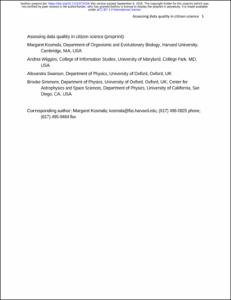| dc.contributor.author | Kosmala, Margaret | |
| dc.contributor.author | Wiggins, Andrea | |
| dc.contributor.author | Swanson, Alexandra | |
| dc.contributor.author | Simmons, Brooke | |
| dc.date.accessioned | 2023-03-08T17:37:31Z | |
| dc.date.available | 2023-03-08T17:37:31Z | |
| dc.date.issued | 2016 | |
| dc.identifier.citation | Kosmala, M., Wiggins, A., Swanson, A. and Simmons, B. (2016) Assessing data quality in citizen science. Frontiers in Ecology and the Environment, 14, pp.551-560. DOI: https://doi.org/10.1002/fee.1436. [PrePrint from https://www.biorxiv.org/content/biorxiv/early/2016/09/08/074104.full.pdf] | en_US |
| dc.identifier.uri | https://repository.oceanbestpractices.org/handle/11329/2155 | |
| dc.description.abstract | Ecological and environmental citizen-science projects have enormous potential to advance scientific knowledge, influence policy, and guide resource management by producing datasets that would otherwise be infeasible to generate. However, this potential can only be realized if the datasets are of high quality. While scientists are often skeptical of the ability of unpaid volunteers to produce accurate datasets, a growing body of publications clearly shows that diverse types of citizen-science projects can produce data with accuracy equal to or surpassing that of professionals. Successful projects rely on a suite of methods to boost data accuracy and account for bias, including iterative project development, volunteer training and testing, expert validation, replication across volunteers, and statistical modeling of systematic error. Each citizen-science dataset should therefore be judged individually, according to project design and application, and not assumed to be substandard simply because volunteers generated it. | en_US |
| dc.language.iso | en | en_US |
| dc.rights | Attribution 4.0 International | * |
| dc.rights.uri | http://creativecommons.org/licenses/by/4.0/ | * |
| dc.subject.other | Citizen Science | en_US |
| dc.subject.other | Quality assurance | en_US |
| dc.subject.other | Quality control | en_US |
| dc.subject.other | Crowdsourcing | en_US |
| dc.subject.other | Data accuracy | en_US |
| dc.subject.other | Sampling bias | en_US |
| dc.subject.other | Sampling methods | en_US |
| dc.title | Assessing data quality in citizen science. | en_US |
| dc.type | Journal Contribution | en_US |
| dc.description.notes | Preprint from https://www.biorxiv.org/content/biorxiv/early/2016/09/08/074104.full.pdf CC-BY | en_US |
| dc.description.refereed | Refereed | en_US |
| dc.format.pagerange | pp.551-560 | en_US |
| dc.identifier.doi | https://doi.org/10.1002/fee.1436 | |
| dc.subject.parameterDiscipline | Environment | en_US |
| dc.subject.dmProcesses | Data acquisition | en_US |
| dc.subject.dmProcesses | Data quality control | en_US |
| dc.bibliographicCitation.title | Frontiers in Ecology and the Environment | en_US |
| dc.bibliographicCitation.volume | 14 | en_US |
| dc.description.sdg | 14.a | en_US |
| dc.description.maturitylevel | Mature | en_US |
| dc.description.methodologyType | Method | en_US |
| dc.description.methodologyType | Specification of criteria | en_US |
| obps.contact.contactname | Margaret Kosmala | |
| obps.contact.contactemail | kosmala@fas.harvard.edu | |
| obps.resourceurl.publisher | https://esajournals.onlinelibrary.wiley.com/doi/abs/10.1002/fee.1436 | |
 Repository of community practices in Ocean Research, Applications and Data/Information Management
Repository of community practices in Ocean Research, Applications and Data/Information Management

